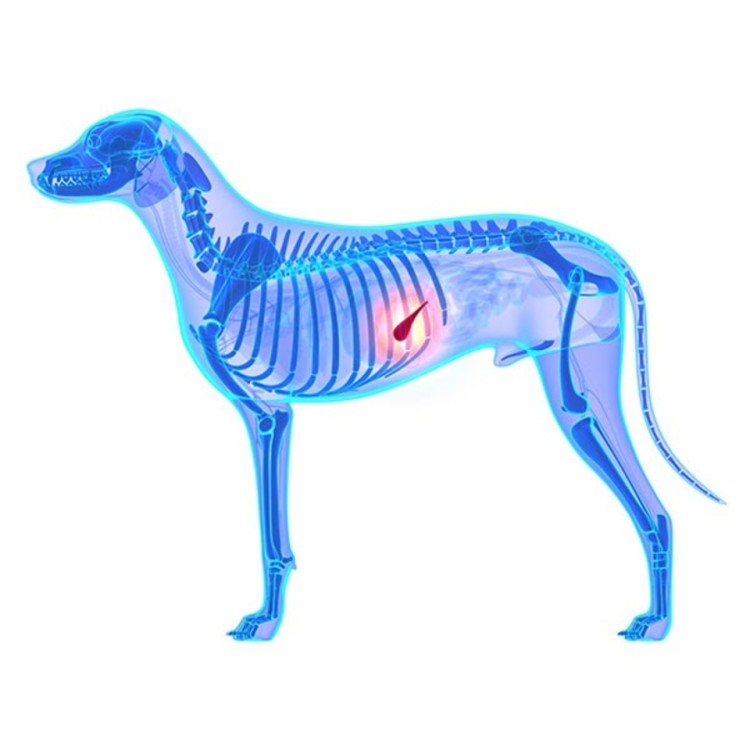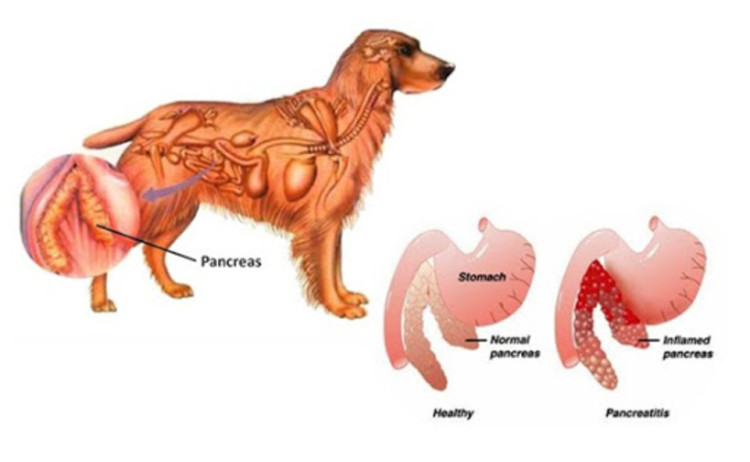The warning signs of pancreatitis in dogs may not always be obvious at first or they might be mistaken for a less serious disease - and yet, the condition could still be life-threatening.
So, if your canine companion tends to indulge in fatty foods or is genetically predisposed to pancreatitis, you might want to learn more about the symptoms, causes, and treatment of this condition in dogs.
Pro tip: Pancreatitis can be a very expensive condition to treat, especially if your dog suffers from a severe case. Thousands of dollars in diagnosis and intensive care treatment might be necessary, depending on the severity of the disease. Pet insurance can help cover these expenses. Look for a policy that reimburses at least part of the costs of a therapeutic diet in case it is needed as part of your dog’s treatment plan.
What Is Pancreatitis? What Causes Pancreatitis in Dogs? Symptoms of Pancreatitis in Dogs How Is Pancreatitis in Dogs Diagnosed? How to Treat Pancreatitis in Dogs Moderate or mild pancreatitis Severe pancreatitis What Is the Prognosis? Can Pancreatitis Be Prevented? Final Words
 (Image source: American Kennel Club)
(Image source: American Kennel Club)
What Is Pancreatitis?
Pancreatitis in dogs occurs when the pancreas is inflamed and swollen. It is caused by the early, inappropriate activation of a digestive enzyme within the pancreas due to pancreatic damage. This causes the pancreas to digest itself. The enzymes destroy the pancreatic tissue and cause damage to the nearby organs as well.
There are two forms of pancreatitis in canines:
-
Acute pancreatitis, which usually comes on suddenly, with no previous signs of the condition before. If the inflammation spreads, it can also affect other organs. Acute pancreatitis can quickly lead to chronic systemic inflammation (SI), shock, and even death, and for that reason, it must be treated aggressively and as soon as signs are seen.
-
Chronic pancreatitis develops slowly, over time, and often without symptoms. This condition can cause permanent changes in the pancreatic tissue. Chronic manifestations of the condition include diabetes (about 30% to 40% of canines with diabetes also have pancreatitis) or more rarely, [exocrine pancreatic insufficiency](https://vcahospitals.com/know-your-pet/exocrine-pancreatic-insufficiency-in-dogs" Exocrine Pancreatic Insufficiency in Dogs | VCA Animal Hospital") (loss of digestive enzyme production).
Even though these two forms of the disease often can’t be differentiated clinically, the symptoms of acute pancreatitis are usually more severe.
What Causes Pancreatitis in Dogs?
In 90% of cases, the cause of pancreatitis in canines is unknown, but there are certain things that might trigger it:
-
Fatty foods. Eating high-fat foods, especially human foods such as fatty pieces of meat, uncooked bacon, gravy, poultry skin, or too much peanut butter.
-
Drugs that are known to cause inflammation of the pancreas include, but are not limited to, some antibiotics, the anti-seizure drug potassium bromide, as well as those used in chemotherapy treatments.
-
Hormonal imbalance, most commonly hypothyroidism, high calcium levels, and diabetes.
-
Pancreatic duct obstruction or backflow, i.e. blockage or reflux of the enzyme ducts in the pancreas.
-
Blunt trauma to the pancreas, such as a car accident or a fall from a height.
-
Some dog breeds are genetically predisposed to pancreatitis, like Miniature Schnauzers, who are prone to problems with high triglycerides, and English Cocker Spaniels, who tend to suffer from immune-mediated diseases, where the immune system might attack the pancreas. Other breeds prone to pancreatitis are Miniature Poodles, as well as some Terrier breeds. Small breed dogs, in general, are more likely to suffer episodes of pancreatitis. Overweight and older pups might also be more susceptible to pancreatitis.
Symptoms of Pancreatitis in Dogs
As we mentioned earlier, pancreatitis can present as a long-term illness (chronic pancreatitis) or as a sudden-onset illness (acute pancreatitis).
In general, chronic pancreatitis is less common in dogs than acute pancreatitis. The most common clinical signs of chronic pancreatitis include:
- Vomiting
- Abdominal pain
- Decreased appetite
- Lethargy
Dogs with acute pancreatitis usually show more serious symptoms like:
- Persistent vomiting
- Diarrhea
- Severe lethargy
- Severe dehydration
- Abdominal pain
- Hunched back
- Fever
- Shock
If your canine companion exhibits one of these symptoms, and only from time to time, be sure to keep an eye on them. However, if they exhibit multiple symptoms at once and more frequently, call your vet as soon as possible.
 (Image source: Australian Dog Lover)
(Image source: Australian Dog Lover)
How Is Pancreatitis in Dogs Diagnosed?
When performing a physical exam to diagnose pancreatitis, your vet will ask about your pet’s medical history and check their stomach, heart, gums, and temperature.
Pancreatitis can be hard to diagnose because, in many cases, the symptoms aren’t specific to the pancreas, which means that routine blood work won’t always be helpful. If the vet suspects your pet has pancreatitis, they might recommend a pancreatic-specific test called specific canine pancreatic lipase (SPEC cPL), in addition to full screening blood work, which detects 83% of pancreatitis cases in dogs.
X-rays aren’t very helpful either, but if the dog is vomiting persistently, abdominal X-rays are used to rule out a potential obstruction of the intestines or stomach caused by a foreign body (something your pooch has eaten).
Ultrasound only detects 68 percent of cases of pancreatitis, but it also gives an opportunity to look at other organs and potentially catch additional complicating factors.
How to Treat Pancreatitis in Dogs
Moderate or mild pancreatitis
Dogs with moderate to mild pancreatitis might be hospitalized for one or a couple of days for IV fluid therapy to help with dehydration. In some cases, the vet might decide that the fluid should be administered subcutaneously (under the skin). This is more common in mild cases of pancreatitis.
Dogs with mild to moderate pancreatitis are also treated with pain-relief medication, stomach protectants, and anti nausea medication. Typically, a low-fat diet is prescribed during the recovery period. A permanent change in diet might be recommended in canines with a previous history of pancreatitis or predisposed breeds.
In general, patients with mild or moderate pancreatitis recover in 1-2 weeks. The cost will depend on the treatment: if the dog is treated as an outpatient, the cost will be around $500-1000, but if they’re hospitalized for several days, the cost can reach upwards of $1500-2500.
Severe pancreatitis
Dogs with severe acute pancreatitis usually require more extensive treatment and hospitalization that can last for several days or even weeks. The treatment might include:
- Pain-control measures
- Intensive intravenous fluid and electrolyte support
- Stomach-protectant medications
- Antinausea medications
- Antibiotics
- Nutritional support (feeding tube)
Patients with severe pancreatitis are often critical and are best treated at emergency and specialist referral centers. . If your vet feels that your dog’s case of pancreatitis is severe they may send you to one of these other clinics for treatment. The cost is estimated at about $2000-5000 but can go much higher if they require long term hospitalization.
Pro tip: Pancreatitis is expensive to treat, especially if it's chronic. Having dog insurance will take the monetary stress that comes with vet bills off of your mind and allow you to focus on your pet’s care.
What is the prognosis?
The prognosis for canines with pancreatitis will largely depend on the severity of the condition and the response to initial therapy. In general, the earlier the diagnosis and treatment, the more positive the outcome.
Most of the mild to moderate forms of pancreatitis have a fair prognosis with aggressive treatment.
The prognosis for patients with severe pancreatitis is poor, which means the risk of death is high. These dogs can die from a severe inflammatory condition that affects the whole body and can lead to multiple organ failure.
Dogs that have recovered from a pancreatitis episode (or repeated episodes) might develop scarring within the pancreatic tissue, which can lead to diabetes and/or EPI (exocrine pancreatic insufficiency).
If left untreated, pancreatitis might progress to the hemorrhagic form and the dog might suffer severe consequences, including sudden death.
Can Pancreatitis Be Prevented?
Dietary management is the best approach to reduce the possibility of pancreatitis recurrence. Lower protein, lower fat, and low allergen diets have all been recommended for dogs with pancreatitis.
Resist the temptation to treat your pooch to human foods, even on special occasions, and make sure your garbage is secure.
A study of pancreatitis in humans suggests that vitamin C, vitamin E (with selenium), methionine, and beta-carotene might help prevent pancreatitis. However, the efficacy of these in dogs is not well known. Always consult your vet before offering any supplements to your furry friend.
Final Words
Unfortunately, once a dog has suffered a pancreatitis episode, the chances of recurrence are high. The best way to prevent this is to be on the look-out for warning signs and control your dog’s diet. Don’t let your pooch become obese (keep them away from high-fat food and make sure they exercise).
Being a responsible and knowledgeable dog owner will help you reduce the risk of pancreatitis, recognize the symptoms when it strikes, and make sure to manage it accordingly.
